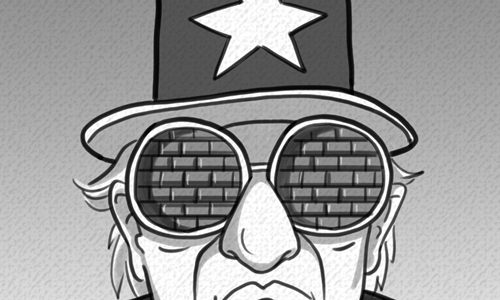Global trust will also take a long time to heal

Illustration: Liu Rui/GT
The ongoing COVID-19 pandemic has shown us the other side of globalization. The world is a community of many self-governed states. The governance styles of different countries are manifested in the varied capabilities and methods of handling domestic emergency affairs, including the current one.The spread of the epidemic highlights that globalization has brought all countries closer, but each nation still relies largely on its own strength to protect its people. International organizations, including those that have played a key role in certain times over the past few decades, can only play an auxiliary role right now at most. Even the member countries of the G7 are doing things in their own way.
Closer global connections not only promote the need for cooperation, they also lead to increasing systematic risks. Ian Goldin and Mike Mariathasan demonstrate this in The Butterfly Defect by saying that "systemic risk issues are now endemic everywhere - in supply chains, pandemics, infrastructure, ecology and climate change, economics, and politics. Unless we address these concerns, they will lead to greater protectionism, xenophobia, nationalism, and, inevitably, de-globalization, rising inequality, conflict, and slower growth."
The remarkable development of globalization has been driven mainly by the power of capital. The trend has become even more unstoppable as emerging economies start to engage in globalization, to boost economic growth, enhance national capabilities, and improve people's lives.
The spread of the coronavirus has led to the suspension of various trade and industrial supply chains established during the process of globalization over the past few decades. Mandatory border entry and exit controls, suspension of air transportation, full control of the export of domestic medical equipment, remind us there are still very staunch and steadfast borders between countries.
Some countries have sent military aircraft to buy face masks and others have intercepted epidemic prevention materials purchased by other countries. This has damaged the trust that globalization helped establish between countries.
Distrust will aggravate the anti-globalization tendency that has emerged over the years and manifested largely through the US' grand strategy of "Make America Great Again." The US has been pursuing its own benefit at the cost of others and international cooperation. It has been attempting to bend the global economic and trade system to its own will.
The US has been a major driver of globalization since World War II. The current retrograde steps of this country, which has the world's strongest economic and trade strength, has brought uncertainty to the prospects of globalization. Now, at this critical moment, the pandemic broke out. According to the World Health Organization, the virus has now gained a foothold in more than 200 countries and regions.
The nature of capital will not change due to the epidemic, and globalization will not stop. After the epidemic, the power of capital will promote the recovery or reconstruction of some economic, trade and financial chains. But the direction, speed and scale of the capital flow will change.
In the short term, capital and trade flows will not repair relations between countries. The world cannot return to what it was before the COVID-19 outbreak as it will be difficult to rebuild trust. Countries will inevitably make policy adjustments according to the gap caused by the outbreak between global and national governance.
International organizations also face such a problem. To solve global issues, nations - especially major powers - need to further strengthen cooperation and enhance the capability of international organizations to cope with crises. But after the epidemic, all countries will focus on improving their national economy, people's livelihood and their own epidemic prevention system.
The epidemic will also deepen American people's distrust of the world and globalization. At present, the US owes WHO dues. US President Donald Trump tweeted on Tuesday that the WHO "really blew it." He said the WHO was "funded largely by the United States, yet very China centric… We will be giving that a good look."
Some US forces insist on implementing comprehensive strategic containment against China. Their policies have been strengthened in the process of epidemic prevention and will inevitably continue after the epidemic.
China-US relations are the most important bilateral relationship in the world. Due to the damage caused by the trade war and high-tech supply chain breaks, mutual trust between the two countries will be even more fragile in the postpandemic world. Therefore it's difficult to be optimistic about the future for China-US relations.
The author is a senior editor with People's Daily, and currently a senior fellow with the Chongyang Institute for Financial Studies at Renmin University of China. dinggang@globaltimes.com.cn. Follow him on Twitter @dinggangchina



